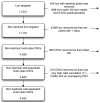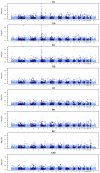Genome-wide association study of CNVs in 16,000 cases of eight common diseases and 3,000 shared controls
- PMID: 20360734
- PMCID: PMC2892339
- DOI: 10.1038/nature08979
Genome-wide association study of CNVs in 16,000 cases of eight common diseases and 3,000 shared controls
Abstract
Copy number variants (CNVs) account for a major proportion of human genetic polymorphism and have been predicted to have an important role in genetic susceptibility to common disease. To address this we undertook a large, direct genome-wide study of association between CNVs and eight common human diseases. Using a purpose-designed array we typed approximately 19,000 individuals into distinct copy-number classes at 3,432 polymorphic CNVs, including an estimated approximately 50% of all common CNVs larger than 500 base pairs. We identified several biological artefacts that lead to false-positive associations, including systematic CNV differences between DNAs derived from blood and cell lines. Association testing and follow-up replication analyses confirmed three loci where CNVs were associated with disease-IRGM for Crohn's disease, HLA for Crohn's disease, rheumatoid arthritis and type 1 diabetes, and TSPAN8 for type 2 diabetes-although in each case the locus had previously been identified in single nucleotide polymorphism (SNP)-based studies, reflecting our observation that most common CNVs that are well-typed on our array are well tagged by SNPs and so have been indirectly explored through SNP studies. We conclude that common CNVs that can be typed on existing platforms are unlikely to contribute greatly to the genetic basis of common human diseases.
Figures






References
Additional References
-
- International HapMap Project. < http://hapmap.ncbi.nlm.nih.gov/>.
-
- McCarroll SA, et al. Integrated detection and population-genetic analysis of SNPs and copy number variation. Nature Genetics. 2008;40:1166–1174. - PubMed
References
-
- Stankiewicz P, Beaudet AL. Use of array CGH in the evaluation of dysmorphology, malformations, developmental delay, and idiopathic mental retardation. Curr Opin Genet Dev. 2007;17:182–192. - PubMed
Publication types
MeSH terms
Grants and funding
- G9521010/MRC_/Medical Research Council/United Kingdom
- G0701810(85517)/MRC_/Medical Research Council/United Kingdom
- G0400874/MRC_/Medical Research Council/United Kingdom
- G0600705/MRC_/Medical Research Council/United Kingdom
- G0000934/MRC_/Medical Research Council/United Kingdom
- G0701810/MRC_/Medical Research Council/United Kingdom
- RG/08/014/24067/BHF_/British Heart Foundation/United Kingdom
- 089989/WT_/Wellcome Trust/United Kingdom
- G0700491/MRC_/Medical Research Council/United Kingdom
- G0500115/MRC_/Medical Research Council/United Kingdom
- G0800759/MRC_/Medical Research Council/United Kingdom
- G90/106/MRC_/Medical Research Council/United Kingdom
- G0501942/MRC_/Medical Research Council/United Kingdom
- G0800675/MRC_/Medical Research Council/United Kingdom
- G0600329/MRC_/Medical Research Council/United Kingdom
- G0701003/MRC_/Medical Research Council/United Kingdom
- 18475/VAC_/Versus Arthritis/United Kingdom
- 17552/ARC_/Arthritis Research UK/United Kingdom
- 083948/WT_/Wellcome Trust/United Kingdom
- 090532/WT_/Wellcome Trust/United Kingdom
- G0701420/MRC_/Medical Research Council/United Kingdom
- RG/09/012/28096/BHF_/British Heart Foundation/United Kingdom
- G19/9/MRC_/Medical Research Council/United Kingdom
- CZB/4/540/CSO_/Chief Scientist Office/United Kingdom
- G0800509/MRC_/Medical Research Council/United Kingdom
- 061858/WT_/Wellcome Trust/United Kingdom
- MC_UP_A390_1107/MRC_/Medical Research Council/United Kingdom
- G0800383/MRC_/Medical Research Council/United Kingdom
LinkOut - more resources
Full Text Sources
Other Literature Sources
Molecular Biology Databases
Research Materials

